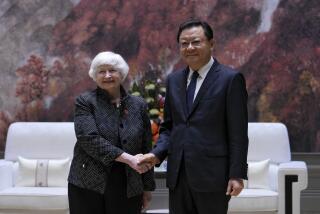As Capitalism Creeps Back, China Seeks Stock Savvy
- Share via
To Thomas Casey, it was “mind-boggling” to think that the People’s Republic of China wanted to learn about securities markets in the United States.
Why, he wondered, would a communist nation that abolished private ownership and banned stock exchanges after the 1949 revolution want to learn about one of the cornerstones of the capitalist system?
The answer, he discovered, is both complex and contrary to popular perceptions of China.
Casey, senior vice president in charge of investments for First American Trust Co. in Santa Ana, is one of 18 U.S. executives who will leave Saturday for a three-week trip through China to share with government and industry leaders there the ways of American financial markets.
“I just think it’s exciting that the Chinese are looking for help to stimulate their securities market,” Casey said. “I had no plans to go to China--ever--but this is a great opportunity.”
In 1950, the Chinese government shut down the Shanghai Stock Exchange and arrested several traders. At the time, Shanghai was the financial capital of East Asia.
But more than three decades later, the government has decided to revive limited stock sales to Chinese citizens to provide public and even small private enterprises with another source of capital.
“The Chinese want to create alternatives to simply spending more state capital,” said Michael E. Lehan, director of financial projects for the Citizen Ambassador Program, which assembled the U.S. delegation. “They want to incorporate components of the free-market system into their system.”
In September, 1986, with considerable fanfare, Chinese authorities allowed two enterprises to sell stock in Shanghai, marking the return of individual investments in large companies.
More recently, shares of other Chinese companies have been sold in at least eight Chinese cities, said Wu Zurong, a spokesman at the Chinese Embassy in Washington.
Because buyers are not allowed to sell their shares to other individual investors, though, China’s stock exchanges usually lack the frenzied atmosphere of Wall Street.
“Apparently, at the Shanghai exchange, they have seven or eight guys just standing there and looking at each other,” Casey said.
Chinese stock differs in many respects from shares issued in other countries.
“It’s impossible for private buyers to amass all the stocks and possess the enterprise,” Wu said. “Stock does not give them ownership rights, just rights to some returns.”
Stocks in Chinese enterprises, he said, are more like bonds or other corporate debt securities. Individuals who buy shares get guaranteed yields of up to 16%, well above the 7% rate that Chinese banks pay for fixed deposits.
In many cases, individuals are not allowed to purchase more than 20 shares, worth a total of 2,000 yuan, or about $540.50. And they can only sell them back to the company that issued them or the bank that underwrote the issue, Wu said.
State-owned industries control most of China’s production. But small, semi-private collectives are increasing both in number and in size, and some are selling stock, according to Chang Chiwei, another Chinese Embassy spokesman.
Since the latest reform movement began in 1979, individuals have been allowed to own small businesses, such as grocery stores and restaurants, Chang said. Last August, Chinese residents rushed to buy shares in Hiway Electrical Co. in Beijing, a small computer systems company that became the first privately owned company to issue stock.
Besides easing the state’s burden on subsidizing enterprises, the stock market revival “gives direct responsibility to the people” for providing capital to Chinese business, he said. Individual responsibility is one of the hallmarks of the reform movement, he said.
But not all Chinese leaders agree that securities sales should have been resumed. Their main concern is that stock sales may transfer state property into private hands.
The Chinese stock market of today is a dramatic change from the old Shanghai Stock Exchange on Hankou Road, which had been denounced by some Chinese writers as a den of iniquity.
“All you could see was a jumble of flushed faces, bloodshot eyes and pallid hands, mixed, as was to be expected, with the smothering, stinking odor of sweat,” one Shanghai magazine recalled in 1985.
The current securities market is “very rustic,” said delegation leader Ronald W. Readmond, a director of Alex Brown & Sons, a Maryland financial services firm. And the Chinese have asked for help, he said.
Last year, the Citizen Ambassador Program sent a delegation to China to explain U.S. securities exchanges and the capital formation process.
The members of the U.S. delegation leaving Saturday are experts at handling trusts, managing portfolios, selling shares in the secondary market, trading in international markets, communicating corporate information to investors and automating some market functions.
The delegation includes three Los Angeles executives: Rosanne P. O’Brien of Glendale Federal Savings & Loan, Thomas Revy of Froley Revy Investment Co. and Scott A. Tagliarino of Fleishman-Hilliard public relations.
Also participating is Paul G. Stevens Jr., executive vice president of the American Stock Exchange.
The group will meet in Seattle on Friday and leave the next day for Beijing. The delegation will also make stops in Shanghai, Guangzhou, Shenzhen and Hong Kong. The members will meet with economic and finance commissions in each province, as well as with government officials and the Industrial and Commercial Bank of China, the primary underwriter of new stock issues in China.
“The Chinese would like to see their markets operate more efficiently and see the latest things in the West,” Casey said.
In that regard, they differ from popular perceptions of the Chinese system.
“The fallacy that exists among the American public and large segments of our financial institutions is that the communist system does not permit incentives much like our economy,” Lehan said.
While private ownership of large, state-run enterprises is not allowed, he said, citizens can buy their shares and receive a portion of their profits.
The Chinese have indicated that they might open their markets to foreign investments as a way to attract capital and ease the burden of state subsidies, Lehan and Readmond said. China has allowed joint ventures between its companies and foreign firms. It also has sold a government bond issue in Europe, Wu said, and is in the process of selling a second.
“What they’re trying to accomplish is to redistribute capital funding by creating enterprises that will exist on their own without so much state control,” Lehan said.
More to Read
Inside the business of entertainment
The Wide Shot brings you news, analysis and insights on everything from streaming wars to production — and what it all means for the future.
You may occasionally receive promotional content from the Los Angeles Times.










